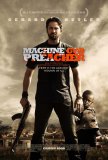Machine Gun Preacher (United States, 2011)
September 29, 2011
Machine Gun Preacher uses the "real-life" story of Sam Childers (Gerard Butler) as the framework for a movie that is part drama, part action, and part social conscience. Like Hotel Rwanda, it seeks to provide a human context to one of Africa's most brutal civil wars. Unlike the earlier film, however, this one is presented from the perspective of an outsider; the horrors he witnesses give birth to a lifelong obsession to oppose the atrocities in southern Sudan. Marc Forster's film is not afraid to venture into dark places, but the ending is layered with artifice and there are several underdeveloped subplots that may have been trimmed due to time constraints. The action sequences are energetic and suspenseful but they don't always mesh well with the dramatic material.
First, to address the veracity of the story, it should be mentioned that Machine Gun Preacher is based in large part upon Childers' autobiographical Another Man's War, which has been accused by various fact-checkers of white washing certain events and making the writer a more heroic figure than he might have been. (The movie briefly addresses this claim when a female doctor accuses Childers of being little more than a mercenary who, despite his good intentions, could end up doing great harm.) Still, the usual disclaimer applies: Never let the facts get in the way of a (good) story. The words "based on" allow for a fair amount of latitude.
Despite at first seeming like a friendly, upbeat story of redemption, of another white man coming to Africa as a savior, Machine Gun Preacher displays an uncomfortable edge. Childers is a loquacious Rambo, and the movie doesn't shy away from displaying his narcissistic and obsessive aspects. He's not a typical hero - in fact, it could be fair to argue that he's an anti-hero. The scenes of carnage in Sudan are disturbing and the Forster's camera doesn't flinch from showing them. In fact, some might argue that they are exploitative. If nothing else, Machine Gun Preacher drives home the inhumanity of the situation far better than any two-minute evening news segment can. Most people will identify Childers as an avenging angel of God - a man who protects the innocent and strikes down the wicked. But, despite relying upon the man's testimony as his primary source, Forster finds room for gray areas. Machine Gun Preacher strikes its most obviously false note at the end when it tries to sew up holes and wrap up things in a tidy, audience-pleasing fashion.
Machine Gun Preacher opens in the late 1990s with Childers, a Hell's Angels biker with an attitude to match the organization name, emerges from incarceration, having served his time but not having been rehabilitated. After having sex with his wife, Lynn (Michelle Monaghan), in a car, the two arrive home where they are greeted by the couple's daughter, Paige (Madeline Carroll), and Sam's mother, Daisy (Kathy Baker). That's when Sam learns what to him is disastrous news: his wife has quit her lucrative job as a stripper because she has found God. Eventually, after a close call with a homicidal drifter who nearly kills Sam and his best buddy, Donnie (Michael Shannon), Sam heeds the Lord's call. He quickly becomes an active evangelist, building a church for hardcore sinners in his neighborhood, then going overseas to Sudan to see if there's anything he can do there. After befriending Deng (Souleymane Sy Savane), a member of the Sudan People's Liberation Army, Sam believes that Jesus wants him to build an orphanage in the war torn country and to go on armed rescue missions of kidnapped children. He does so, but without giving much thought to how his overseas activities impact his rural Pennsylvania family.
Gerald Butler's performance as Childers is one of the best things Machine Gun Preacher has to offer. He captures the essence of a volatile man gripped with the obsessive conviction of the utter rightness of what he is doing. Butler approaches Childers like a comic book character who carries a cross in one hand and an AK-47 in the other. He's a gung-ho individual, all piss and vinegar and holy water, but there are times when we get glimpses into the dark side of his soul - the parts not washed clean by his baptism.
Parts of Machine Gun Preacher don't work. Most of those deal with Sam's home life. His relationship with his daughter isn't as affecting as it is meant to be, and most of it is developed through cute, facile moments. It's a montage without the music. Likewise, his friendship with Donnie has been trimmed to the point where one frequently wonders why Donnie is present. We keep expecting this secondary character to have some purpose beyond lurking in the background acting impotent but it never happens. This has the appearance of a subplot currently playing on the cutting room floor.
It would be interesting to know how deeply Forster buys into Childers' mythology. The way he has constructed Machine Gun Preacher hints that he may recognize a lion's share of the accepted story as a tall tale. The screenplay is cinematic but not necessarily true. With less elaborate action sequences than those he oversaw in Quantum of Solace, Forster allows Machine Gun Preacher to succeed on the Rambo level while at the same time offers a rudimentary current events lesson to viewers who don't pay attention to what's happening half way around the world. Looking for anything deeper is probably a mistake.
Machine Gun Preacher (United States, 2011)
Cast: Gerard Butler, Michelle Monaghan, Kathy Baker, Michael Shannon, Madeline Carroll, Souleymane Sy Savane
Screenplay: Jason Keller
Cinematography: Roberto Schaefer
Music: Asche & Spencer
U.S. Distributor: Relativity Media
U.S. Release Date: 2011-09-30
MPAA Rating: "R" (Violence, Profanity, Sexual Content, Drugs)
Genre: DRAMA/ACTION
Subtitles: none
Theatrical Aspect Ratio: 2.35:1
Comments